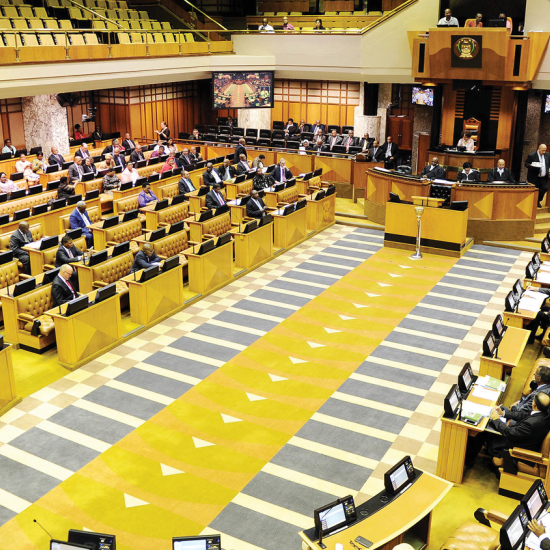Skills for democracy:
Boosting South Africa’s legislative sector for constitutional stability

As South Africa tackles complex challenges including social injustice, economic transformation, unemployment and environmental sustainability, the Legislative sector remains vital to safeguarding our constitutional democracy. This sector, comprising Parliament and nine provincial legislatures, plays a critical role in democratic governance, policy-making, and legal frameworks through several key functions: enacting laws, representing the public, providing oversight, managing budgets, protecting constitutional principles, and facilitating policy discourse.
Equipping the legislature’s administrative function with appropriate skills directly affects legislators’ ability to fulfill their mandate. A recent skills analysis of the sector’s administrative function reveals important findings about skills drivers, gaps, and development needs.
This opinion draws from research conducted by the University of Free State, commissioned by the Public Service Sector Education and Training Authority (PSETA) in partnership with key legislative institutions. Unlike other public service areas governed by the Public Service Act of 1994, the legislative sector operates under distinct frameworks and requires tailored approaches to skills development. The PSETA, one of 21 sector education and training authorities, facilitates skills planning and learning interventions across government institutions, with this study providing a foundation for aligning skills development with the legislative sector’s specific mandates.
The legislative sector has implemented various professionalism initiatives with varying consistency
Key skills change drivers
Several factors are driving changes in skills requirements across South Africa’s legislative sector. These include digital literacy needs, legal and regulatory changes, evolving customer service expectations, diversity and inclusion demands, professionalisation requirements, talent management challenges, austerity measures, demographic shifts, globalisation and workplace trends.
Major drivers affecting future skills needs include the political landscape, budgetary constraints, legislative changes, technological advancements, organisational transformation and global changes. These drivers create significant skills implications: digital literacy, policy analysis capabilities, customer-centric service design, cultural competence, leadership development, workforce planning, financial efficiency, global trends analysis and innovative problem-solving. Integrating these diverse drivers into a cohesive skills development agenda is essential for achieving broader objectives of socio-economic growth and enhanced public service delivery.
Skills gaps
The legislative sector faces several key skills gaps that hinder its effectiveness. These include political acumen, strategic leadership, analytical and decision-making skills, communication and oversight engagement, change management, and global awareness.
Technical and policy development skills shortages are also prevalent, including legislative drafting, information communication technology, financial modelling, and technological awareness. These gaps limit the legislatures’ ability to develop effective laws and policies.
Measuring these gaps remains challenging due to insufficient skills audits, leading to poor standardisation of job profiles and fragmented development efforts. Critical skills shortages make filling essential positions difficult, especially in information technology, specialised knowledge areas and legal committees. Consequently, the sector struggles to balance the demand for and supply of necessary skills.
Skills development and professionalisation efforts
The legislative sector has implemented various professionalisation initiatives with varying consistency. These include internal training plans, bursary opportunities, induction programmes and initiatives focused on ethics and conduct standards. Ethical conduct receives particular emphasis through seminars, webinars and e-learning platforms. The sector also utilises experiential learning, leadership sessions, graduate programmes, and succession planning for professional development.
While the 7th Parliament demonstrates a clear drive toward professionalisation, the sector’s relationship with the broader public service professionalisation framework presents challenges. Despite operating outside the Public Service Act, the sector aligns with certain framework principles such as onboarding and performance management systems.
Strategic recommendations
To address these challenges, we recommend the following strategic initiatives:
- Conduct a comprehensive skills audit across the sector.
- Develop targeted training programmes for administrative and support staff.
- Increase investment in reskilling employees for virtual committee work and technological changes.
- Implement robust monitoring to assess the impact of sector-specific qualifications and development initiatives.
- Prioritise development of sector-specific scarce skills and transversal skills.
- Develop a standardised competency framework across all legislatures.
- Establish a joint forum for coordinating skills development with stakeholders, including PSETA, legislatures and higher education institutions.
- Strengthen collaboration between the sector and PSETA through formalised partnerships.
- Develop legislative sector-specific qualifications with higher education institutions.
This article is based on research conducted by the University of the Free State on the Legislative Sector Skills Needs Analysis for the PSETA. The authors write in their personal capacity, and the views expressed are theirs, not those of the PSETA or the university. 

